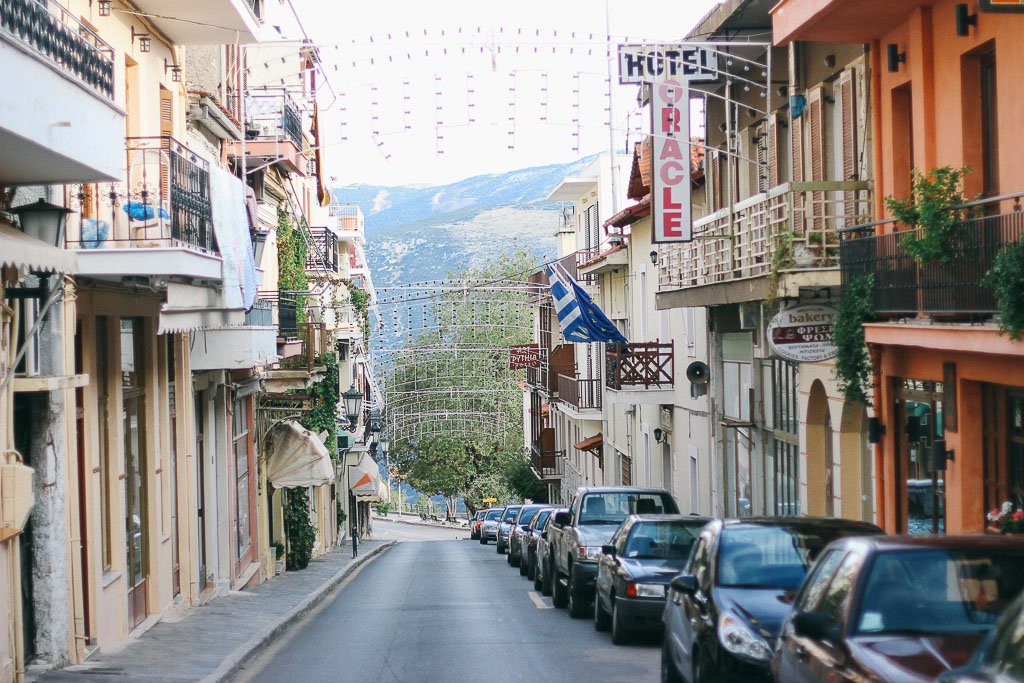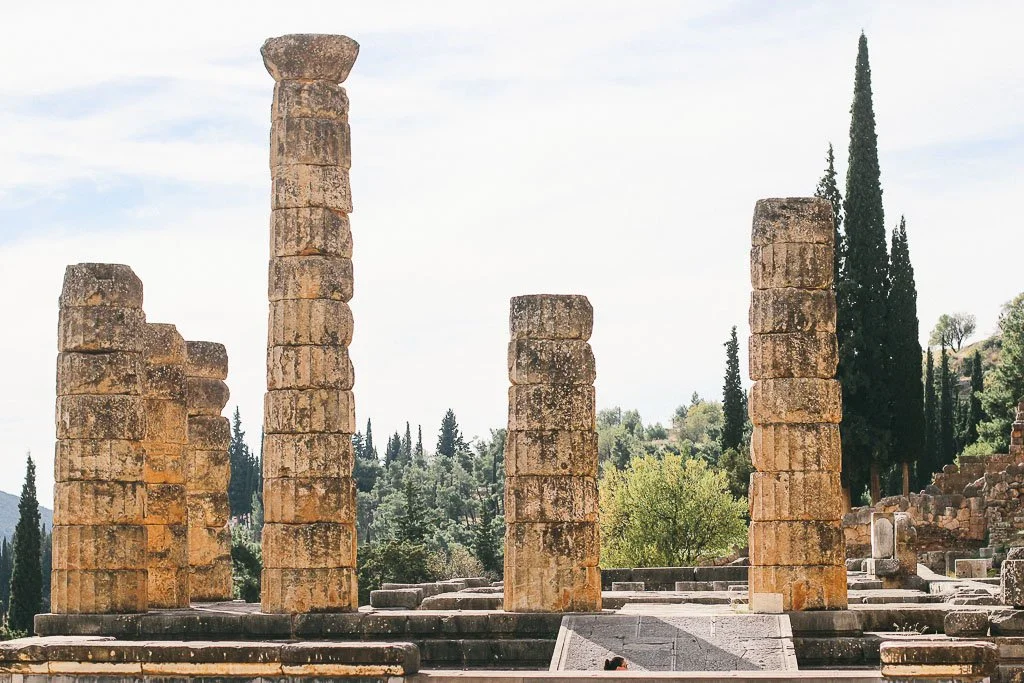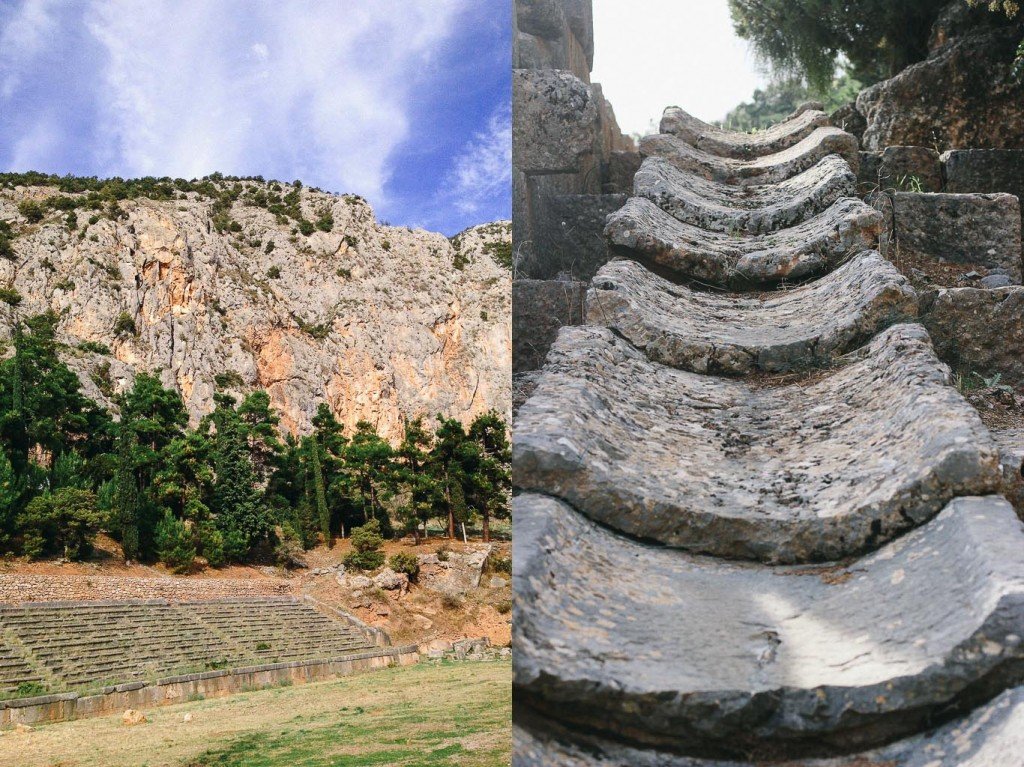GREECE PART 3: DELPHI
“In this place I am minded to build a glorious temple to be an oracle for men, and here they will always bring perfect hecatombs, both they who dwell in rich Peloponnesus and the men of Europe and from all the wave-washed isles, coming to question me. And I will deliver to them all counsel that cannot fail, answering them in my rich temple.”
-- Homeric Hymn to Apollo
In the ancient world, Delphi was believed to be the center of the universe. Myth has it that Zeus set forth two eagles, one from the east and the other from the west, and where they met in flight marked the exact center of the world – the “navel” of the earth. This coordinate was denoted by an omphalos, a cone-shaped statue with a hollow center.
Delphi was a sacred place to the Greeks. It is where Apollo (god of the sun, music, healing and truth), just a mere four days after his birth, battled the serpent dragon Python to avenge his mother. Drawing golden arrow from silver bow, Apollo slew the monstrous beast and was worshipped thereafter as the patron of Delphi.
The women who served as his oracles were given the title Pythia, in honor of his triumph over Python. These prophetesses would channel Apollo directly and issue prophecies to all of his supplicants. Seated upon a golden tripod, she would become entranced, inhaling hallucinogenic vapors that seeped out of a fissure in the earth below her and uttering words considered to be direct messages from the gods.
Pythia’s utterances would guide the course of Greco-Roman history for centuries, for not only did she advise on family matters, but also on matters of state and war. Even the Spartans consulted the oracle before the famed Battle of Thermopylae. Pythagoras, Sophocles, Herotodus, Socrates, and yes, Alexander the Great himself, were among those known to have made the pilgrimage to Delphi.
I can only imagine the scene. The year is 334 BCE. Alexander the Great and some 40,000 of his warriors have just marched from Macedonia through the winding mountains to Delphi. The ambitious young conqueror is considering launching an invasion of Persia, but he must first seek a prophecy from the oracle, as his men will not follow him to battle if the gods are not on their side.
To his dismay, Pythia turns him away, informing him she is forbidden from prophesizing on this day, and asks him to come back another time. Outraged by such hubris and intent on receiving his prophecy, he seizes the priestess by her long hair and drags her out of the sanctuary towards the temple. Struggling to break free and realizing all attempts are futile, she calls out, “You are invincible, o young!” Alexander, hearing music to his ears, quickly releases her from his grasp and haughtily retorts, “Now I have my answer!”
Sitting high upon the lofty slopes of Mount Parnassos, looming gracefully over the glistening waves of the Gulf of Corinth below, Delphi is easily one of the most impressive archaeological sites in the modern world. It’s a great day trip (or overnight) from Athens by bus or car. The journey weaves you deep into the Greek countryside, across olive groves and through charming hillside towns with streets so narrow you wince every time another car or bus (gulp!) passes on the other side. If you do take a bus, you are dropped off at the In Delphi Taverna, a quaint cafe that charmingly doubles as a bus station.
The little mountain town of Delphi has a very Alpine quality to it, with just two main streets adorned with hotels that look like a bit like lodges and chalets. Lined with a colorful row of flags that curve around a bend, the main street leads to the archaeological site. You’ll find the museum at the base of the site, but the real magic awaits you in the mysterious hills behind it, where you’ll walk the Sacred Way, a switchback trail that snakes you around the mountain. Looking down upon the sprawling valley, towards the distant gulf below, it’s hard not to feel like you’re on top of the world and easy to see why this place was sacred in its day.
Following the same steps as those who lived thousands of years before, you’ll pass the Roman Forum, the Bull of the Corcyreans (a gift from Corfu to thank the oracle for a prophecy that led to a bountiful catch of tuna fish), the conical omphalos (a modern replica of it), the Treasury of the Athenians, the Sphinx of Naxos (a bribe from Naxos to guarantee access to the oracle during her busiest times), and the Great Altar, where one hundred bulls - a hecatomb – would be sacrificed to Apollo.
Farther up the slopes, is the remarkably well-preserved theater that once was frequent host to 5,000 playgoers a night, and higher still, where the crisp mountain air smells of pine, is the stadium, which housed the Pythian games (second only to the Olympics). Both structures are equally impressive sights to behold with soaring views of the valley, but the crown jewel of the entire sanctuary is the majestic Temple of Apollo with its giant Doric columns that tower over the trees, where the oracle, Pythia, her eyes wild and her gestures frenzied, would issue the great fortunes of man.
It is here, standing in these ruins, where your mind really starts to wander back in time, imagining what it must have been like to journey to the center of the world, alongside the most storied figures in history, to ask the oracle whatever burning questions you may have had on your mind or in your heart. What would they have been? And what fate of yours would the gods have decreed? The mountains seem to be filled with whispers of prophecies long told and long forgotten, both of dreams dashed and hopes fulfilled, that one has to wonder just how many fates of the modern world were derived right here, among these ancient hills, amid the fragrant trees and aging stones, nearly 3,000 years ago.
DELPHI TRAVEL NOTES:
Ancient Delphi Archaeological Site/Sanctuary of Apollo – easily one of the most spectacular ancient sites in all of Greece
Hotel Pan – affordable hotel on the main drag with a “mountain lodge” feel, wonderful balcony with sweeping views of the Gulf of Corinth and the expansive valley below, excellent breakfast served in dining room (best Greek yogurt we had in Greece!)
Taverna Dion – extremely hospitable staff, excellent homemade Greek fare, fresh pasta, delicious desserts
In Delphi Taverna – tavern/bus station with great coffee, where we experienced Greek hospitality at its finest (the owner warmly welcomed us out of the rain to wait for the bus, served piping hot cappuccinos, and assured us every time we anxiously glanced up as a bus drove by that it wasn’t our bus)
Terminal B – bus station in Athens with daily service to Delphi (buses fill up, so it's best to buy a return ticket as soon as you arrive)
Want more Greek mythology and travel stories? Check out Greece Part 1: Santorini, Greece Part 2: Mykonos+Delos, and my Ode to Amphitrite.



























